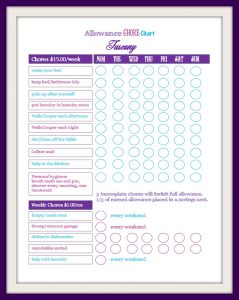
 Our children recently came to us asking if they could re-negotiate their allowance. They are now 15 years old, and it’s become evident over the years that money management is not part of the school curriculum. Keeping in mind that the primary purpose of an allowance is to teach them the value and management of money–which will ultimately lead them to financial success–I went on my merry way to devise a “plan”. To begin with, I considered our family’s core values regarding money: we hold strong beliefs that our children should earn their money and that they should help out around the house. We know that teaching them to become productive members of society is critical to their success, and their allowance provides us an important opportunity to teach them money management skills.
Our children recently came to us asking if they could re-negotiate their allowance. They are now 15 years old, and it’s become evident over the years that money management is not part of the school curriculum. Keeping in mind that the primary purpose of an allowance is to teach them the value and management of money–which will ultimately lead them to financial success–I went on my merry way to devise a “plan”. To begin with, I considered our family’s core values regarding money: we hold strong beliefs that our children should earn their money and that they should help out around the house. We know that teaching them to become productive members of society is critical to their success, and their allowance provides us an important opportunity to teach them money management skills.
After much deliberation, I arrived at the conclusion that if the allowance is given unconditionally, the child develops a sense of entitlement and doesn’t learn that earning money requires some output of energy or skill as compensation for a job done. Whereas, when they earn their allowance, they develop a much clearer understanding of money management skills as they expend the energy involved in earning. The ultimate goal of this exercise is to set the stage at home, where the stakes are still low, to instill in children the desire to work for their money and take pride in earning it.

That being said, the rate of allowances at our house has always been paid at what we feel is a reasonable amount: $1.00 for each year of age, paid weekly. So our children will now receive, $15.00 each week “conditionally“. Developing the conditions is individual to each family. For instance, to earn their $15.00 each week, we will expect ten chosen household chores to be done each day, every week. If in any week three are not completed, they agree to forfeit their full allowance. You’ll see on the visual that these jobs are pretty typical of their age group, and include only tasks they have already mastered. Should they wish to earn up to $5.00 more each week, we’ve added five optional chores in a list from which they get to choose.
So now I hope we’ve developed a plan in which they can earn a meaningful amount of money.

The next essential process is teaching them to manage these earnings. Allowing them to spend their earnings on something they truly want teaches them that “work merits reward” but it’s vital to coach them not to blow their earnings as soon as they have it in their jeans and to help them recognize the importance of accumulating through a “savings plan“. Keeping this in mind, the children have agreed that one-third of their earnings will go into a savings account for that “special something” they’re wishing for.